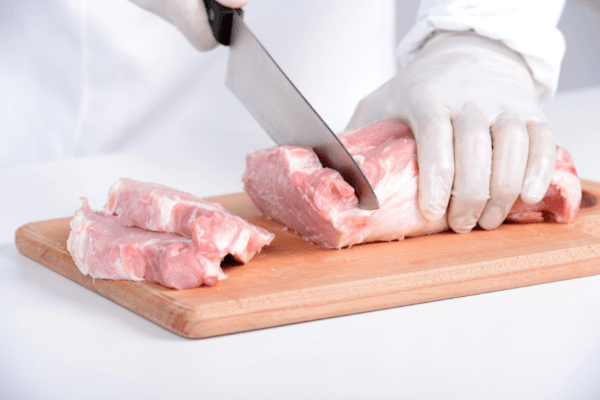The lack of meat processing facilities in the U.S. has been a big problem for decades. Continued consolidation has led to larger but far fewer plants nationwide. They are also more highly concentrated in certain geographic regions. Today, there are roughly 800 USDA-inspected slaughterhouses, with a small number accounting for the vast majority of production.
Beef, pork, poultry and other animal farmers have felt the pain of this shortage for a long time. On average, American farmers must drive 400 miles to transport their animals to slaughter. Landing a spot at a facility is also difficult, with many booked solid for months or even a year or more. When a farmer has to wait for processing, they must keep feeding the animals, which is costly.
Small and midsize farmers have an especially hard time finding processing because their volume is low. Those who offer certified-organic, grass-fed or otherwise humanely raised meats have an additional challenge: To bear these label claims, which consumers increasingly seek out, they must be able to guarantee total traceability, which most processers can’t or won’t do. It simply isn’t efficient, cost- or labor-wise, for facilities to track an animal’s meat from intake to finished product to ensure that the steaks or sausages or ground turkey a farmer receives come entirely from their animals.
Until very recently, most consumers were oblivious to the meat processing bottleneck. For the most part, they could find the meat products they wanted when they wanted. That changed abruptly when COVID-19 hit and the nation’s largest processing plants became hot spots for the virus, forcing scaled-back operations or complete shutdowns. Suddenly, grocery store meat selection dwindled.
At the same time, many consumers felt compelled to get closer to their food sources and tried to buy meat directly from farmers. Small, local farmers would’ve loved to have met their needs, but due to the lack of processing—and the seasonality of the meat business, which most consumers aren’t aware of—they couldn’t keep up with demand.
So what’s the solution to this longstanding problem? With such a clear need and, it would seem, money to be made, why aren’t farmers and other food and ag entrepreneurs starting up meat processing facilities left and right?
Put simply, this is a tough business to make work. It is very high overhead, likely costing a couple million bucks to build a new facility and several hundred thousand to get an old one up to code. And unless a prospective processor has a proven track record in this space, they can have a tough time securing bank loans and other capital.
Seasonality also presents a challenge. As Jessica Roosa, founder of This Old Farm, a small USDA-inspected meat processor in Indiana, explains in the latest Edible-Alpha® podcast, July through January are the busy months, with slots booked up and not enough capacity to meet demand. Then February through June, business declines 60% to 70%, with her salespeople calling around trying to secure business. It costs a lot of money to keep a facility running year-round when it’s operating well below capacity for several months.
It’s also hard for processors to find and retain skilled labor. Butchery is somewhat of a lost art, and employees of large facilities often don’t know how to process entire animals.
Despite all these hurdles, it is entirely possible to make money in meat processing, which entrepreneurs like Jessica have proven. But it takes ingenuity, innovation, business savvy, hard work and a whole lot of passion. FFI can guide people looking to break into this business by connecting them with resources, trainings and other entrepreneurs who’ve made it work.
When organic farmer Jessica Roosa couldn’t find meat processing to suit her needs, she started her own facility. The past 11 years have been a long, challenging but ultimately rewarding journey as she has learned the business, built and rebuilt, and scaled her operations. Her conversation with Tera provides valuable insights and lessons for farmers and prospective meat processors alike.
Listen to the Latest Podcast
And now, our roundup of the best food and beverage finance news, events and resources from around the web…
Business Model Insights
- Saffron Road founder talks succeeding with Walmart (New Hope Network)
Natural brands that partner with Walmart can scale dramatically and see huge success, but executives need to be methodical in their approach. Here’s what you should know. - What brands need now is pervasive innovation (New Hope Network)
- How has the exodus of women from the workforce during the pandemic impacted food & beverage? (FoodNavigator-USA)
Raising Capital
- The Restaurant Revitalization Fund is open for applications, but operators fear it’s not
- Whipstitch Capital: CPG innovation is benefiting from a 10-fold investment increase in ESG funds (FoodNavigator-USA)
Investors say that, along with attracting sustainability-minded consumers, CPG brands that invest in restoring healthy farmland could also cash in on ESG-earmarked funding and secure high-value assets to support future growth. - Has the ‘Buy Black’ Movement Made a Difference for Food Entrepreneurs? (Civil Eats)
- Ready to sell: How CPG brands can ensure a successful exit strategy (Food Dive)
CPG/National Brands
- How to Comply with the National Bioengineered Food Disclosure Standard: Q&A with Label Insight’s Anna Thibaut (Food Industry Executive)
- IRI: “We could be anywhere near 7% to 10% price inflation as a benchmark” for CPGs late this year (FoodNavigator-USA)
- Three Factors Driving Rising Manufacturing Costs (Consumer Brands Association)

Market Trends
- Lard makes a comeback as trends play to the maligned fat’s strengths (Food Dive)
The once out-of-favor ingredient is finding its way into more recipes as consumers embrace “fat in moderation” and try to reduce waste by using more of the animal. - SPINS data shines light on why ‘consumers returned to real dairy in droves during the pandemic’ (FoodNavigator-USA)
- Organic food sales hit record $56.4B in 2020 (Food Dive)

Farming and AgTech
- Carbon Markets Stand to Reward ‘No-Till’ Farmers. But Most Are Still Tilling the Soil (Civil Eats)
Most farmers who follow ‘no-till’ practices are only reducing their tilling—which may cancel out the climate and soil-health benefits that have spurred the no-till hype. - Cargill Backs Cow Masks to Trap Methane Burps (Bloomberg Green)
- Organic farming doesn’t have to mean excessive tillage (EcoFarming Daily)
Deals/M&A
- Low-sugar products market hitting higher gear (The Food Institute)
With three in five consumers opting for low-sugar products, big CPGs are acquiring brands that offer these better-for-you foods and beverages to make their portfolios nutritionally healthier. - Oatly’s Extraordinary Debut Fuels Health Food M&A Pipeline (Mergers & Acquisitions)
- Stage acquires Haystack Mountain Cheese (DairyReporter)

Industry Events
Virtual events:
- KeHE Holiday Show: 6/10–6/18
- Digital Food & Beverage Connect: 6/15–6/16
- FFI-FaBcap Accelerator Pitch Event: 6/16
- BevNET Live: 6/22–6/23
- NOSH Live: 6/22–6/23
- Edible-Alpha® Quarterly Trend Talk: 6/28 (Read 5/3 Huddle notes here.)
- North American Agroforestry Conference: 6/28–7/2
- IFT FIRST: 7/19–7/21
- American Cheese Society Annual Conference: 7/28–7/30
- FFI Raising Equity Workshop: 9/21–9/23
- Natural Products Expo East Virtual Extension: 9/22–9/25
In-person events:
- World Pork Expo: 6/9–6/10 in Des Moines, IA
- Soil Health Academy: Transforming Your Dairy and Quality of Life: 6/22–6/24 in Cold Springs, MN
- Sweets & Snacks Expo: 6/25–6/28 in Indianapolis, IN
- Acres U.S.A. Summer Intensive with Zimmer Ag: 7/19–7/20 in Lone Rock, WI
- MOSES Organic Field Day: Organic Row Crops Plus Prairie Restoration: 7/22 in Madison, SD
- MOSES Organic Field Day: Creative Land Access and No-Till Vegetable Research: 7/31 in Decorah, IA
- Soil Health Academy: Increasing Profitability Through Cropping System Management: 8/3–8/5 in Attica, IN
- MOSES Organic Field Day: Systems Approach to Organic Farming: 8/18 in Turtle Lake, WI
- MOSES Organic Field Day: Silvopasture for Livestock & Pollinators: 8/21 in Menomonie, WI
- SNAXPO21: 8/22–8/24 in Charlotte, NC
- SupplySide East: 8/24–8/25 in Secaucus, NJ
- The NAFEM Show 21: 8/25–8/28 in Orlando, FL





